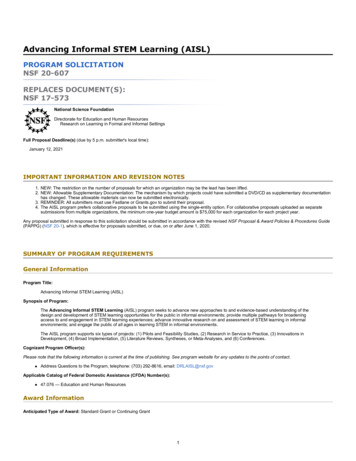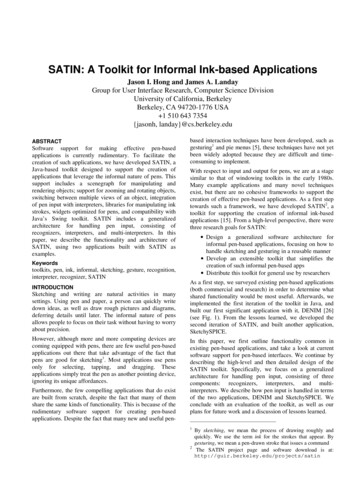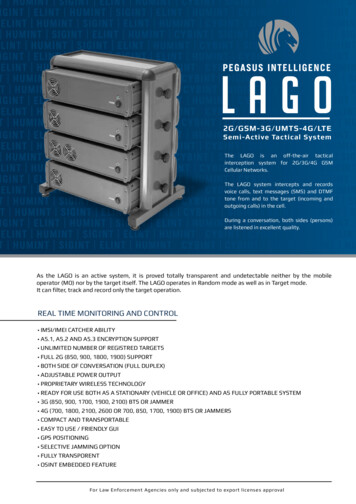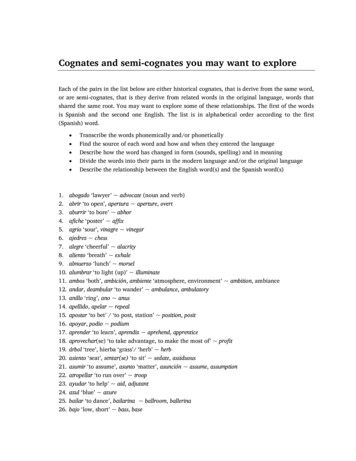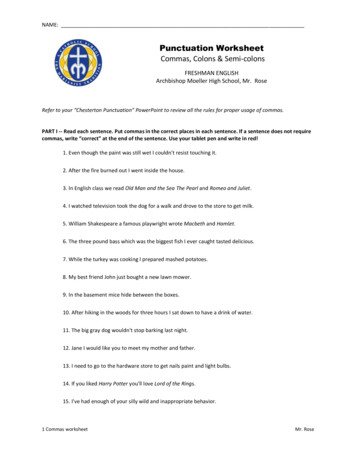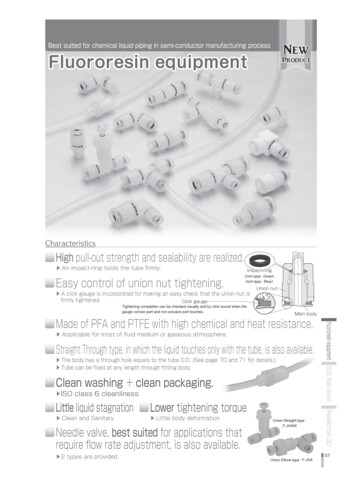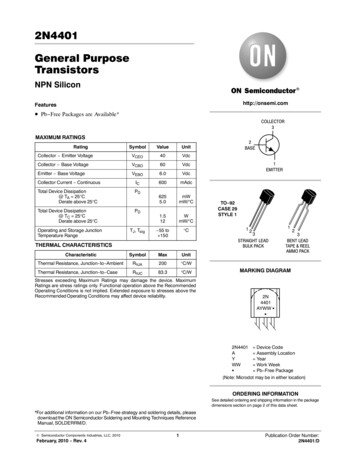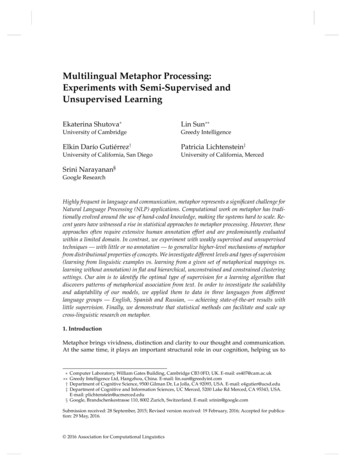
Transcription
Formal, Semi-Formal, & Informal EnglishWhy is it important?Would you wear this to a job interview? No, because it's too informal.Would you wear this to the beach? No, because it's too formal.In the same way, using English that is too formal or too informal for thesituation can cause a bad impression.www.espressoenglish.net Shayna Oliveira 2014
Three levels of formality in EnglishFormal - Textbooks, official reports, academic articles, essays, businessletters, contracts, official speechesSemi-formal - Day-to-day interaction with colleagues and teachers, popularmagazines/books, interviews, when talking with someone in authority or whoyou respectInformal - Interacting with friends, speaking or chatting onlineFormal English1. Longer/more complex sentencesPunctuation, proper grammar, and correct sentence structure are veryimportant. A formal sentence you might see in an academic journal:Research has shown that learning a second language, in addition toleading to expanded career and social opportunities, can also expand thereasoning capability of the brain, although this finding is disputed bysome scientists.A less formal way to express the same idea:Learning another language can improve your career and social life. Somepeople also say it can make you smarter, but others disagree.2. Larger and less common wordsA formal sentence you might see in an economic report:The economy is currently quite robust; nevertheless, some specialistspredict an imminent recession.A simpler, less formal way to say the same thing:The economy is very strong right now, but some specialists say we'll havea recession soon.www.espressoenglish.net Shayna Oliveira 2014
Some less formal words and their formal equivalents:Less formal:help (n.)buyneedgetnext/lateralso/pluswholeenoughMore moreoverentiresufficient3. Avoid phrasal verbsThe price went up.The price rose/increased.The client asked for a contract.The client requested a contract.The problems have come back.The problems have returned.We will cut down on spending.We will reduce spending.4. Avoid contractionsI'm, you're, can't, don't, wasn't, it's.The shipment hasn't arrived.The shipment has not arrived.www.espressoenglish.net Shayna Oliveira 2014
They're manufactured in China.They are manufactured in China.He's the director of marketing.He is the director of marketing.We'd like to inform you.We would like to inform you.What about this? - The company's employeesThis is OK to use in formal English because it's a possessive, NOT acontraction! It means "The employees of the company."With possessives, you can use either 's or "of the" - but try to avoid using "ofthe" multiple times in a single phrase:the terms of the client's contractNOT: the terms of the contract of the client5. NO idioms, slang, text speakIdiom: The software is a piece of cake.The software is quite user-friendly.The software is extremely easy to use.Slang: A million bucks in profit.www.espressoenglish.net Shayna Oliveira 2014
A million dollars in profit.Text speak: Tks & we look 4ward 2 meeting u.Thanks, and we look forward to meeting you.Also avoid shortened words:The info was incomplete.The information was incomplete.The results have arrived from the lab.The results have arrived from the laboratory.fruits and veggiesfruits and vegetablesSemi-Formal English1. Phrasal verbs & contractions OKCould you look over this report?look over review and check for errorsShe came up with a great idea.came up with created, invented, thought ofwww.espressoenglish.net Shayna Oliveira 2014
I'm available on Friday morning.The directors weren't happy.To learn phrasal verbs,take the Phrasal Verbsin Conversation Course!2. Some idioms are OK, but avoid slang and text speakThis project is on the back burner.on the back burner not a priority at the momentWe're operating in the red.in the red no money, negative cash flowSemi-formal (inviting your boss): "Would you like to join me for lunch?"Informal (inviting your best friend): "Hey, wanna grab a bite to eat?"Semi-formal: "Hello, how are you?"Informal: "Wassup?"Semi-formal: "The conference was great!"Informal: "It was awesome!" "It was the bomb!"3. Use polite Englishwww.espressoenglish.net Shayna Oliveira 2014
Say "I'd like." instead of "I want."When making requests, use "could you" and "please," don't just givecommands: Say "Could you please call me later?" and not just "Call melater."Another part of polite English is making criticisms and negative comments inan indirect way:You're wrong.I'm afraid you're mistaken.I disagree.I'm of a different opinion. / I see it differently.This is terrible work.This could be improved.I don't like it.I don't really care for it.It's not my cup of tea.I'd prefer.Informal English1. Shorter, simpler sentences - perfect grammar is not as important(So don't be so nervous about mistakes when speaking!)www.espressoenglish.net Shayna Oliveira 2014
"Have you finished your work yet?" "Finished your work yet?""I'm really liking this book."("like" should technically not be in the -ING form here)"But I don't think so."Starting sentences with "but," ending sentences with prepositions, usingsentence fragments - these are all done in informal spoken English.2. Expressions/exclamationsum, uh, like, lemme see. hesitation, when you need a moment to thinkbefore speaking I mean. to clarify.you know? to check if the other person understandsGotcha. I understandHow come? Why?Yeah right. a sarcastic way to say "I don't believe you."I'll say! I definitely agree with youwow! surpriseoops accidentyuck that's disgusting3. Phrasal verbs, slang, and idioms are used VERY frequentlyThis is one reason that watching movies and TV shows in English is difficult.even if you have good vocabulary and grammar! You may not have learned thephrasal verbs, slang, and idioms in your textbook.Phrasal verb: "I won't put up with this!"put up with toleratewww.espressoenglish.net Shayna Oliveira 2014
Idiom: "Could you give me a hand?"give me a hand help meSlang: "I aced the test!"aced got an excellent gradeThe Phrasal Verbs in Conversation Course and the English Idioms Coursecan help you learn these expressions in context!4. Reductions when speaking (in both semi-formal and informal English)He's gonna be angry.gonna going toI wanna learn how to ski.wanna want toDidja like the movie?didja did youWe hafta leave now.hafta have toI bought apples n grapes.n andwww.espressoenglish.net Shayna Oliveira 2014
Courses to help you learn:Business English Course - Focuses on formal and semi-formal English usedin meetings, presentations, interviews, letters and e-mails, and vocabulary forjobs and careers.Everyday English Speaking Course - Daily situations, socializing, phrases,expressions not found in textbooks, how native English speakers say things inreal life.Phrasal Verbs in Conversation - Teaches phrasal verbs in context, throughdialogues, making it easier to learn and understand them. Quizzes and writingexercises help you put the phrasal verbs into practice immediately.Thanks for attending!Examples of more formal / less formal words:Less FormalMore Formala lot ofmany, much, numerous, a great deal ofaboutregardingafter thatthereafteralso / plusmoreoveranswerrespondask forrequestwww.espressoenglish.net Shayna Oliveira 2014
at firstinitiallybettersuperior, nsivedrinkbeverageeatconsumeendterminate, completeenoughsufficientfixrepairgetobtain, acquirehelpassist, assistancehomeresidencein the endfinally, ultimatelyI've got to / I have toI must, It is necessary for me tokind of / sort ofrather, edneedrequire, necessity/requirementnext/latersubsequentlyOK / all rightacceptable, satisfactoryoldelderlypeoplepersons, individualspeople say that it is said that right awayimmediatelywww.espressoenglish.net Shayna Oliveira 2014
seemappearshowdemonstratesotherefore, thus, consequentlystartbegin, commencestart againresumestopceasesweatperspire, perspirationtellinformthat's whythereforetryattemptvery, reallyquitewantdesire, would like, ectyou (generic)one, everyonewww.espressoenglish.net Shayna Oliveira 2014
Business English Course - Focuses on formal and semi-formal English used in meetings, presentations, interviews, letters and e-mails, and vocabulary for jobs and careers. Everyday English Speaking Course - Daily situations, socializing, phrases, expressions not found in textbooks, how native
